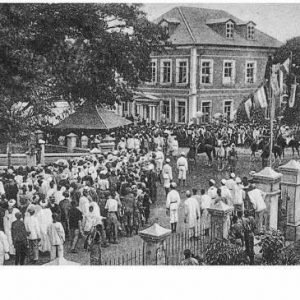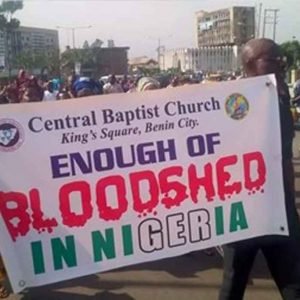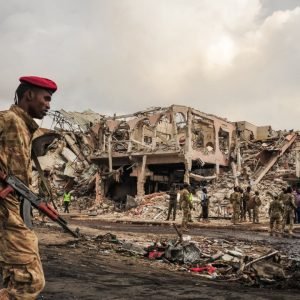By Nnenna Joseph
Etumbe and his brothers discovered that these children were orphans, uncouth, primitive but self-sufficient. Their mum he learnt was a generational wealthy princess who traded in cocoa. She had left them natural resources and inheritance- Etumbe drooled.
The African continent was taken over by the Europeans who described them as uncouth and primitive, offering to bring them their perceived form of civilization while milking the contents of its God-given inheritance (natural resources).
The Partition of Africa began in earnest with the Berlin Conference of 1884-1885 and was the cause of most of Africa’s borders today. This conference was called by German Chancellor Bismarck to settle how European countries would claim colonial land in Africa and to avoid a war among European nations over African territory(Blackpast.org)
Etumbe and his brothers took over the children, enslaved them, took their inheritance and fed them crumbs. To offer them a false sense of security, Etumbe and his brother gave them leadership positions to govern their resources by proxy. This they called Democracy and Organized unionism.

The 54 countries in Africa were distributed between the major states of Europe who were invited to the Berlin Conference. Germany, France, Great Britain, Netherlands, Belgium, Portugal, and Spain were all considered to have a stake in the partition of Africa. The conference was concluded without the presence of any African or African leader to speak for itself how this arrangement will affect it. African indigenous rulers were later on made to sign an “x” to a general agreement for protection by a European power. These rulers had no idea what they were signing since most could not read, write, or understand European languages.
With colonization came the core elements of colonization (Boarders, Religion, Education, political and economic implications).
The conference agreed that the colonial masters will ensure they bring the following elements as listed below of supposed civilization to their colony.
With the presence of cultural interjections, cohabitation of both colonial masters and the indigenes, other elements of colonization were born, and these elements would later become factors of disunity among Africans till date.
A brief look at the substantial elements of the scrambling and partitioning of Africa by diaspora hoodlums, and the ripple effects on the unity of the continent.
– Education– The most misunderstood benevolence of the west is education.
Scholars argue that education civilized Africa. It is usually argued in favour of colonialism that it brought western education and hence western civilization to the shores of Africa which by implication is a positive contribution towards African development. A misgiving.
This argument will appear to be true on the surface level or superficially, but if it is subjected to critical analysis, it will reveal the hollowness or emptiness of colonial education which is partially responsible for the present African underdevelopment. Colonial education was not rooted in African culture and therefore could not foster any meaningful development within the African environment because it had no organic linkage. Furthermore, colonial education was essentially literary; it had no technological base and therefore antithetical to real or industrial development. ( Ocheni et al Cs Canada).
Like the orphaned children who had their methods to make the most of the resources around them, Africans would have continued their informal methods of education and would have developed faster but for Etumbe and his brothers- the colonial masters.
Western education has also been labelled one of the major causes of unemployment stemming from over dependency.
To further pinpoint the hazards of education, we see northern Nigeria, a region that has held strong to their roots in farming, as against their southern counterparts who are 70% dependent on western education. At the core of every national issue in Nigeria is the south’s educational background trying to lord the north and the north holding back. The “End Sars” protests in Nigeria give a perfect reference.
– Religion
Religion is the opium of the masses, says Karl Max. A large percentage of terrorism, wars, banditry in Africa stem from religious inclination. One only wonders how a people who were alien to these religions 400 years ago got acclimated they are willing to go to lengths to defend its tenets.

For instance, the amalgamation of 1914 was insensitive in its approach, merging northern and southern Nigeria without recourse as to their varying religious backgrounds. We see Boko haram insurgencies as a testament for that. An Islamic sect that abhors westernization and is attacking Christians and Muslims with varying beliefs.
The intra religious conflicts of Somalia remain a puzzle. Somalia, the most religious heterogeneous country in Africa is saddled with long theological religious conflicts. With western religion came a large level of intolerance, which prior to westernization, was an all-man-to his gods.
– Creating Borders
States, regions, countries, intra and inter-country borders were created by the Europeans who cast them on maps without ever having to step foot on the areas designated and no recourse to the ethnic and cultural affinities. This created a lot of errors that would degenerate to a lot of conflicts and disunity.
Since the 1950’s when nations became independent, these borders became one of the major sources of conflict- the infamous Cameroon/Nigeria Bakassi peninsula.

Another instance, they split Somalis into French Somaliland, British Somalia, Italian Somalia, Ethiopian Somalia, and the Somali region of northern Kenya. These colonial borders have created disunity effects on Somali people who share a common culture, a similar way of life, and the same religion, but live as separate citizens of Ethiopia, Djibouti, and Kenya.
1929 “Ogu Umu Nwanyi”: Women Riot Or Women’s War?
Similarly, the Afar people of Ethiopia were split amongst Ethiopia, Eritrea, and Djibouti, and the Anyuaa and Nuer were split between Ethiopia and South Sudan.
Quickly remember that the Fulanis are nomads, they want to graze their herds in vast lands, no thanks to inconsiderate border lines, Nigerians have been faced with Fulani herdsmen clashes and attacks with non-Fulani communities all over the country stemming from irregularities in border creations.
– Political and Economical
It is old news that the entirety of the partitioning was based on political and economic satisfactions of the colonial masters.
Economically, they posited to milk Africa of all its natural and mineral resources, enriching the taskmasters and their colony.
The chief of all disunity in Africa is corruption. Corruption is snowballed in the political sector. African rulers are ill-famed to be highly corrupted, which could be traced back to the legacy of colonialism.
Picking a clue from (Njoku, 2005:99)Colonial powers’ evil socio-political culture produced the habit of corruption in public service of contemporary Africa.
From this, therefore, one can deduce that the existing corrupt behaviour of the contemporary leaders of Africa is the continuation of the policies
and administration of imperialists. It is obvious that corruption is one of the most attributing factors of disunity. The most recent Mali coup of 2019/2020 comes handy.
Political corruption has also led to intrastate crimes like the Niger Delta militancy.
Economically, colonialism turned the continent to producers of primary products and cash crops as well as raw materials which have no more market value. This, in turn, caused unequal trade transactions (Farah &
Mazongo, 2011:3). Owing to the exploitation of resources, a paradigm shift in dependency and thought processes by the colonial masters, the continent has been forced to rely on the importation of foreign products. This has made the continent to depend on very expensive manufactured goods from outside by what is gained from export of cheaper primary products.
This has created disunity by extension in various ways, the rate of crime is on the rise due to poverty. Organized banditry is mostly a function of poverty. It has been realised that Africa is poorer today than it would have been had colonialism not occurred.
Solution
Given the heterogeneous composition of most African states, what Africa needs the most is administrative tact, political tolerance and social justice to retake each country from the beginning, revamp, strategize and create peace, unity and prosperity. These essential ingredients are to be provided by the continent’s leadership.
Etume groaned, he hated their arrogance, the guts, the will power, their color, their tact and their perseverance to take their inheritance back, and flourish it their own way.

